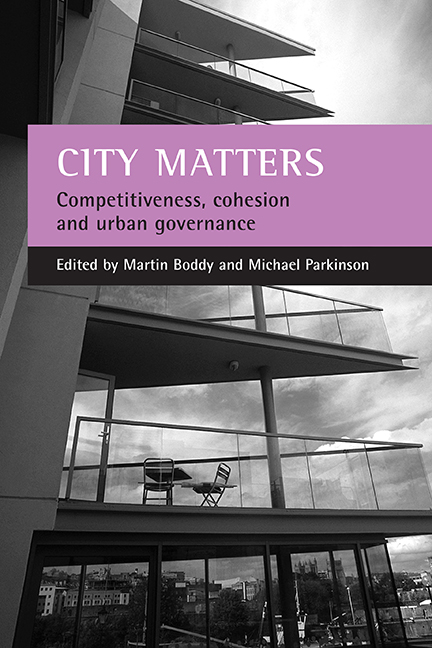Book contents
- Frontmatter
- Contents
- List of tables and figures
- Foreword
- Acknowledgements
- Notes on contributors
- one Introduction
- Part One Competitiveness, cohesion and urban governance
- Part Two Competitiveness and urban change
- Part Three Competitiveness, innovation and the knowledge economy
- Part Four Housing, property and economic performance
- Part Five Space, place and social cohesion
- Part Six Ethnicity, enterprise and social cohesion
- Part Seven Leadership, governance and social capital
- Conclusions
- Index
four - Competitiveness and cohesion in a prosperous city-region: the case of Bristol
Published online by Cambridge University Press: 20 January 2022
- Frontmatter
- Contents
- List of tables and figures
- Foreword
- Acknowledgements
- Notes on contributors
- one Introduction
- Part One Competitiveness, cohesion and urban governance
- Part Two Competitiveness and urban change
- Part Three Competitiveness, innovation and the knowledge economy
- Part Four Housing, property and economic performance
- Part Five Space, place and social cohesion
- Part Six Ethnicity, enterprise and social cohesion
- Part Seven Leadership, governance and social capital
- Conclusions
- Index
Summary
A large, free-standing city in prosperous southern England, Bristol has demonstrated considerable competitive strength and capacity for economic adaptation over recent decades. This has been reflected in significant expansion in both population and employment and has contributed to rapid growth in household numbers. Unemployment rates across the area as a whole has generally been low compared with national rates. However, there are significant concentrations of high unemployment and deprivation both in the core inner city and outer social housing estates of Bristol District. Five Bristol wards are among the worst 10% nationally in terms of the government’s composite indicator of deprivation.
In the context of the ESRC ‘Cities’ Research Programme and the other studies reported in this volume, Bristol thus represents a specific example of competitive success. However, it also raises particular issues relating to poverty and social exclusion within what is in many other respects a highly successful city-region. It is a particularly useful vehicle, therefore, through which to explore issues of competitiveness, cohesion and the relationship between the two. As with the other city case studies in the programme, the study as a whole covered a wide range of themes and issues and generated an extensive range of outputs. This chapter presents an overview of key findings linked to the core questions addressed by the overall research programme.
First, it presents a brief account of patterns of economic and social change and shifts in the spatial structure of the city-region, including edge-of-city expansion. It looks at the role of financial services and the cultural and media sector both of which are prominent locally and which have often been seen as key drivers of competitive strength both nationally and internationally. It then looks in turn at the core issues of competitiveness and cohesion, before finally discussing the role of policy and governance in shaping the city-region and the broader implications that can be drawn from this.
The changing city
On the economic front, the Bristol economy has performed well both in a regional context and compared with national and international benchmarks (Boddy, 2003b). Cheshire et al (2002) ranked Bristol 26th out of 121 large city-regions across Europe in terms of annual growth in per capita GDP over the period from 1978-80 to 1992-94.
- Type
- Chapter
- Information
- City MattersCompetitiveness, Cohesion and Urban Governance, pp. 51 - 70Publisher: Bristol University PressPrint publication year: 2004
- 1
- Cited by



